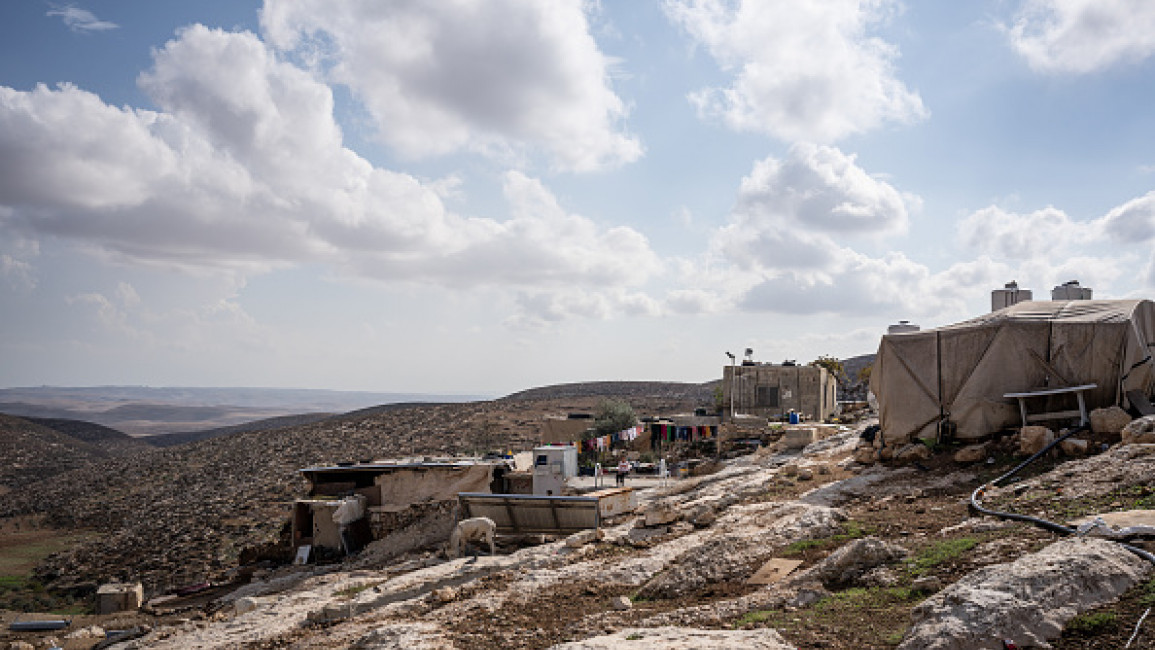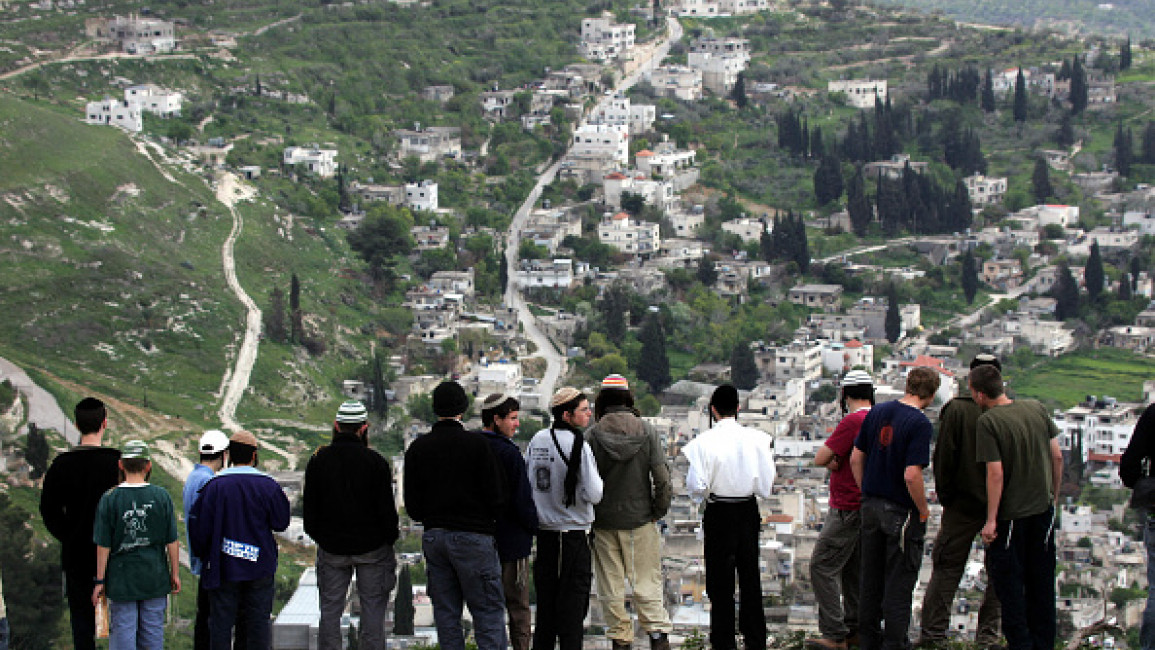
How Israeli settler outposts in the West Bank are surging amid the Gaza war

In the last five months of Israel’s ferocious assault on Gaza, Jewish settlers have been intensifying the illegal construction of outposts in the occupied West Bank, whether by force, threat, or military decree.
Between October and January, settlers in the Palestinian territory built at least 15 outposts and 18 roads that only Jewish Israelis are permitted to use, along with hundreds of meters of fences and multiple roadblocks.
Outposts consist of makeshift encampments built without government approval by members of Israel's settler movement seeking to enforce an Israeli presence on occupied Palestinian land. Located in Area C of the West Bank - approximately 60 percent of the territory under full Israeli control - they are illegal under both international and Israeli law.
However, they are often authorised retroactively by Israeli courts as settlements.
In a January report, Peace Now, an Israeli group monitoring settlement developments, documented an unparalleled rise in settlement activities in the aftermath of the war in Gaza. Settlers have been pushing their presence across the West Bank by establishing or re-establishing outposts beyond areas near existing settlements, paving roads cutting through private Palestinian land, and erecting barriers along them.
"Between October and January, settlers in the West Bank built at least 15 outposts and 18 roads that only Jewish Israelis are permitted to use, along with hundreds of meters of fences and multiple roadblocks"
This increasing outpost and road construction activity has effectively translated to the annexation of large swathes of Palestinian-owned land and restrictions on Palestinian movement in a clear move to expel Palestinians from the surroundings.
Exploiting the ongoing military aggression in Gaza, Israeli settlers have persisted in taking control of sizeable parts of Area C, thus further fragmenting the West Bank and marginalising the Palestinian presence.
“In times of war, settlers take advantage of the situation to start building illegal outposts,” Mauricio Lapchik, Peace Now’s director of external relations, told The New Arab, observing that his organisation reported a similar surge in outposts during the years of the Second Intifada in the early 2000s.
These actions have been accompanied by an escalation of settler violence since Hamas’ attack on southern Israel on 7 October, with assaults and harassment against Palestinian residents and the destruction of their property occurring almost daily, often without army or police intervention.
“This massive push to build roads and outposts, and destroy resources for Palestinians, is so much in coordination with the Israeli state,” Lara Kilani, a member of Good Shepherd Collective pursuing justice in the Holy Land, told The New Arab.
Settlers are being “emboldened” by the state in their violent displacement efforts, she said, citing the case of Al Sukhun village in the Jordan Valley, which was ethnically cleansed last week after Israeli settlers, with the support of the state, erected an outpost near the village 10 days before.
Kilani noted that the near-total lockdown imposed by the Israeli military in the West Bank has facilitated the expansion of outposts, with dozens of Palestinian villages and towns sealed off. Meanwhile, major roads have been almost exclusively accessible only to settlers or Israeli soldiers, who have blocked traffic and prevented economic activity, harassing Palestinian farmers and shepherds in the process.
Settler attacks have intensified since Tel Aviv unleashed its offensive on Gaza, building on decades of violence in the occupied Palestinian territory that culminated in a record-high year for settlement construction and outpost legalisation in 2023. This trend has caused many Palestinians to move in search of safety and to protect their livelihoods.
|
|
In 2023, 26 new illegal outposts were erected, of which at least 10 were set up during the war. Some 1,345 Palestinians were forced to flee from their homes as a result of violent attacks by settlers following the establishment of outposts, according to data from Israeli human rights group B'Tselem. Around 21 Palestinian communities were uprooted, 16 of them after 7 October.
Since the conflict began, over 1,240 Palestinians from at least 20 herding communities in the West Bank have been forcibly displaced amid settler violence and access restrictions, based on UN sources.
The UN humanitarian affairs office recorded 650 attacks by Jewish settlers against Palestinians up to 18 March. During that period, at least nine Palestinian residents were killed by settlers and more than 400 were killed by Israeli military forces.
“The underlying effort behind outpost or road construction and settler violence is to disrupt the economic means that allow Palestinians to remain on their lands,” Kilani said, explaining that outposts are increasingly set up in the proximity of rural communities, away from settlements, with the purpose of grabbing more land and resources from Palestinian villagers.
"Since the Gaza war began, over 1,240 Palestinians from 20 herding communities in the West Bank have been forcibly displaced, while 650 settler attacks on Palestinians have been recorded"
In the current military and political environment, settlement construction and land grabs carry on completely unchecked. The election of the present right-wing government was seen as a blessing for the settler movement and Jewish settlers are quickly expanding their presence in the West Bank, now numbering some 700,000 people, which makes up 10 percent of Israel's nearly 7 million population.
Peace Now’s spokesman pointed to “major developments” that paved the way for rampant settlement activity. Last year, Netanyahu’s government transferred administrative powers relating to settlement land administration from military authorities to civilian officials.
Leader of the Religious Zionism party Bezalel Smotrich, a settler himself, was appointed as finance minister as well as an additional minister in the defence ministry, assuming authority over the military units in charge of civilian policy in the West Bank. This gives him unprecedented influence on settlement planning approval, which could facilitate annexation, according to the UN.
The far-right minister last May presented a two-year plan under which half a million more settlers would move to the West Bank.
Earlier this month, Israel's settlement-planning authority approved projects for nearly 3,500 new housing units throughout the West Bank, the first move of such kind since 7 October.
The Israeli cabinet announced last Friday the confiscation of 8,000 hectares of Palestinian land in the Jordan Valley in east of the West Bank. The Settlement Directorate, headed by Smotrich, declared the confiscated lands “Israeli lands” for implementing settlement projects.
Lapchik highlighted that Smotrich represents “the interests of the settlers” and pointed out how the Israeli state effectively acts as if it is responsible only for the security of settlers, instead of fulfilling its obligation as an occupying power to protect the occupied population in accordance with international law.
|
|
“This government is probably the most pro-settler one in Israel’s history,” the spokesperson said, referring to the cabinet’s plans for taking over more parts of the West Bank. The essence of its annexation aims, he suggested, is enshrined in the coalition’s agreements which state that “the Jewish people have an exclusive right on all the land” between the Mediterranean Sea and the Jordan River.
The Peace Now activist warned that Israel’s ongoing process of annexation of parts of the occupied territory poses an “existential threat” to the future of Israel and the future of a Palestinian state. “If this government accomplishes its plans, in the years to come we’re going to see the creation of one Jewish supremacist state from the river to the sea,” he said.
"If this government accomplishes its plans, in the years to come we're going to see the creation of one Jewish supremacist state from the river to the sea"
Kilani raised serious concern over the whole settlement enterprise in action, beyond the short-term acceleration in settlement construction, when discussing how more facts on the ground threaten to reshape the demography of the Palestinian territory.
“It’s about this underlying infrastructure that enables and supports these actions, and thus creates a long-term vision of what the West Bank will look like over the next years.”
Alessandra Bajec is a freelance journalist currently based in Tunis.
Follow her on Twitter: @AlessandraBajec



![Minnesota Tim Walz is working to court Muslim voters. [Getty]](/sites/default/files/styles/image_684x385/public/2169747529.jpeg?h=a5f2f23a&itok=b63Wif2V)






